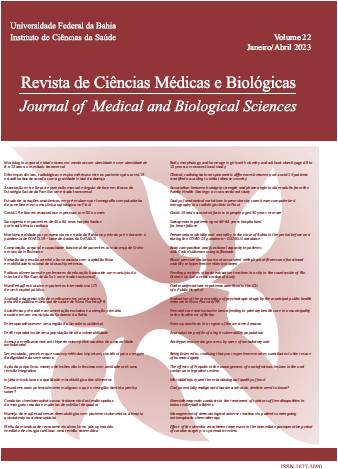Práticas alimentares de professores da educação básica de um município do interior do Rio Grande do Sul
um estudo transversal
DOI :
https://doi.org/10.9771/cmbio.v22i1.51290Mots-clés :
perfil nutricional, práticas alimentares saudáveisRésumé
Introdução: no Brasil, é possível identificar mudanças nas práticas alimentares nas últimas décadas, alimentos tradicionais como arroz e feijão perderam a importância e foram substituídos por alimentos prontos para o consumo. Objetivo: diante disso, o objetivo do estudo foi avaliar as práticas alimentares de professores da rede municipal de educação de Passo Fundo, RS. Metodologia: foi realizado um estudo transversal com professores de ambos os sexos da rede municipal de educação. Os professores foram convidados a participar do estudo por meio de correio eletrônico da prefeitura municipal. A coleta de dados foi mediante formulário eletrônico com questões sobre condições sociodemográficas, saúde e práticas alimentares Resultados: foram avaliados 108 professores, a média de idade foi de 42,81 anos (DP=8,85) e 95,4% eram mulheres. Em relação às práticas alimentares, observou-se que 68,7% (n=71) apresentaram práticas alimentares satisfatórias, sendo que a média de pontuação foi de 45,46 (DP=8,33). Conclusão: apesar do elevado percentual de práticas alimentares excelentes, observa-se práticas alimentares inadequadas que podem contribuir para a ocorrência de excesso de peso ao longo do tempo.
Téléchargements
Téléchargements
Publiée
Comment citer
Numéro
Rubrique
Licence
(c) Tous droits réservés Revista de Ciências Médicas e Biológicas 2023

Ce travail est disponible sous la licence Creative Commons Attribution 4.0 International .
A Revista de Ciências Médicas e Biológicas reserva-se todos os direitos autorais dos trabalhos publicados, inclusive de tradução, permitindo, entretanto, a sua posterior reprodução como transcrição, com a devida citação de fonte. O periódico tem acesso livre e gratuito.






